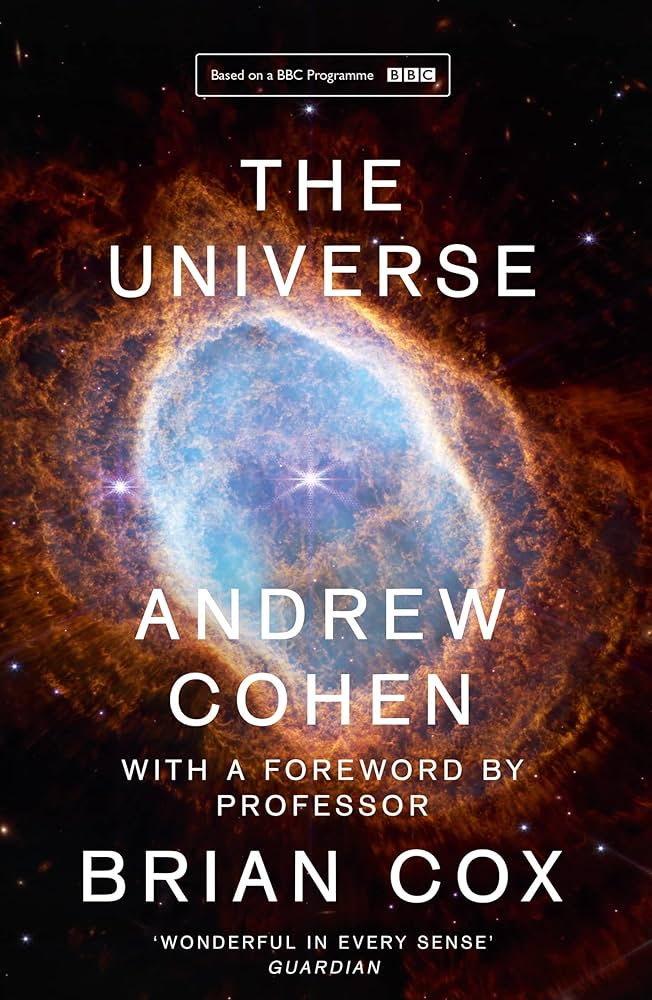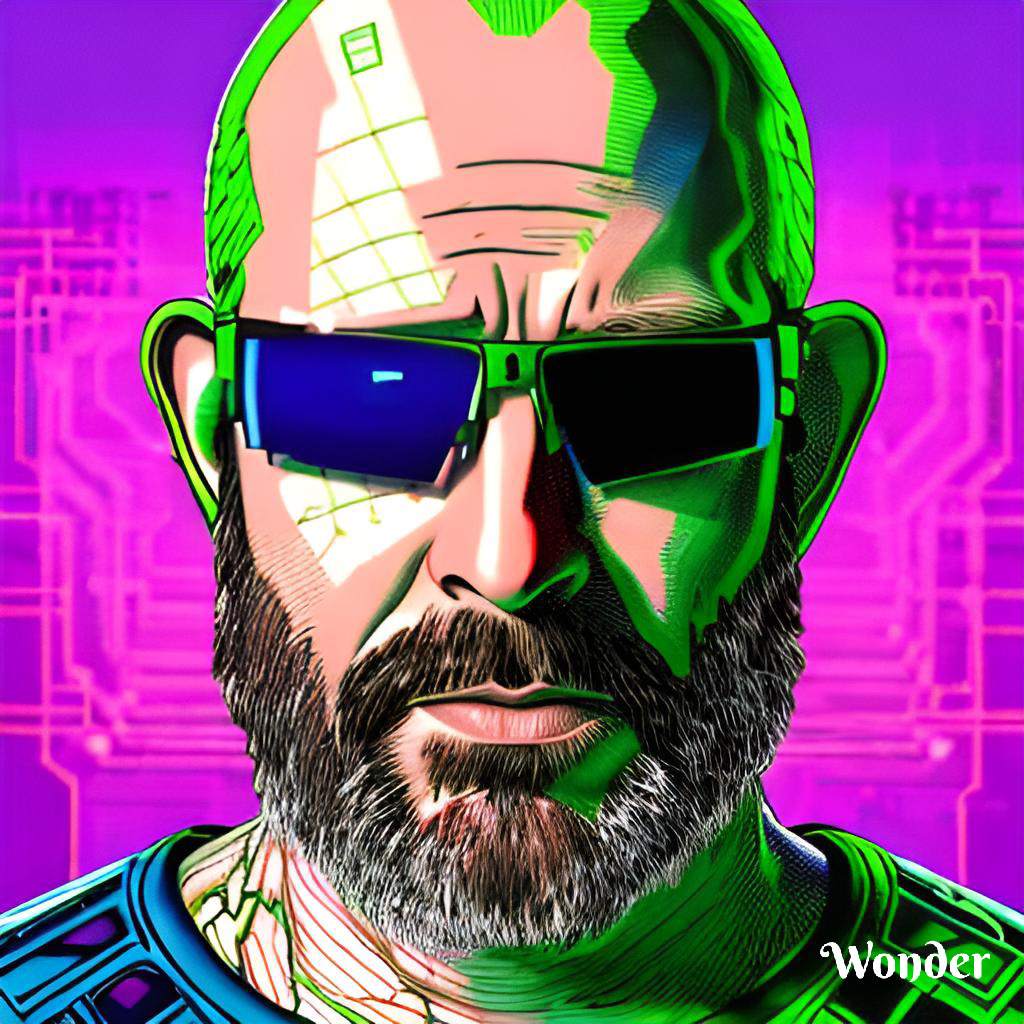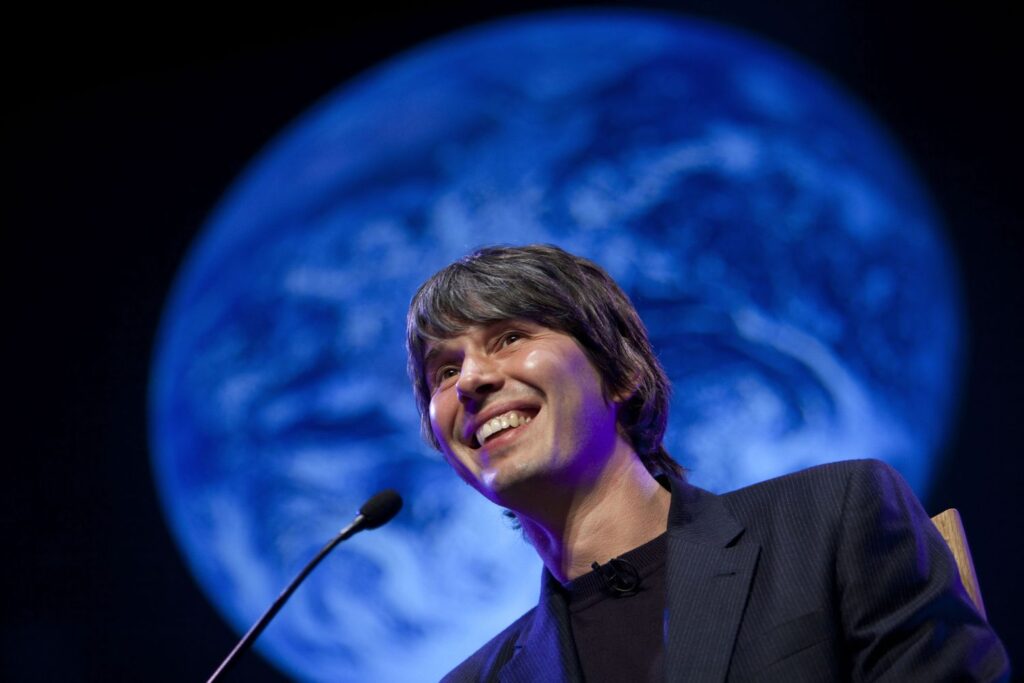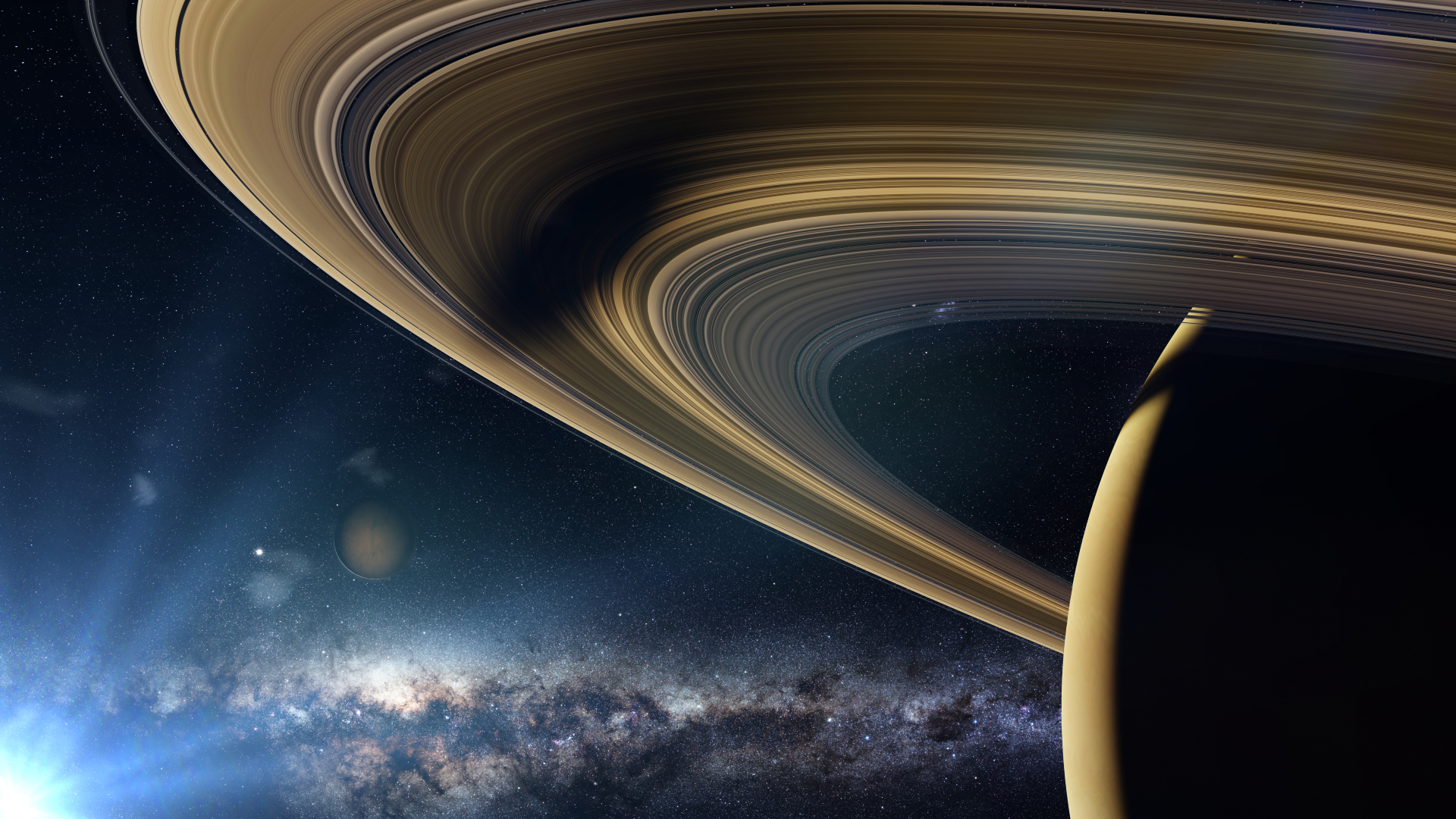Table of Contents
A Unique Path from Music to Science
Born in Oldham, England, on March 3, 1968, Brian Cox grew up with a deep fascination for space and the mysteries of the universe. Inspired by Carl Sagan’s Cosmos series and popular physics books, he developed an early interest in science. However, his teenage years took him in a different direction—music. Cox joined the British rock band Dare as a keyboardist, touring and recording throughout the late 1980s. Later, he became a member of D:Ream, a pop group that achieved mainstream success with their 1994 hit Things Can Only Get Better, which even became a political anthem in the UK.
During his time with D:Ream, Brian Cox enrolled at the University of Manchester, where he pursued a degree in physics. Juggling life as a musician and an academic, he demonstrated a rare ability to thrive in both artistic and scientific fields. Even while on tour, he dedicated himself to understanding complex concepts in particle physics. Eventually, his commitment to science outweighed his musical ambitions, leading him to leave the music industry behind. Cox went on to earn his PhD in high-energy particle physics, focusing on experiments at the HERA accelerator in Germany. His transition from pop star to physicist was unconventional, but it set the foundation for his future as both a respected researcher and a world-renowned science communicator.
From Musician to Physicist
Although his music career brought commercial success, Brian Cox never lost his passion for science. Even while performing with D:Ream, he remained dedicated to his studies, balancing stage performances with rigorous coursework in physics. His desire to explore the universe extended beyond lyrics and melodies, pushing him to complete his degree at the University of Manchester. When D:Ream disbanded in 1997, Cox saw an opportunity to fully immerse himself in scientific research. He pursued a PhD in high-energy particle physics, shifting from the world of synthesizers and concert tours to the realm of equations and particle collisions.
As part of his doctoral research, Brian Cox worked at the HERA particle accelerator in Hamburg, Germany, where he studied deep inelastic scattering, a key process in understanding the structure of protons and neutrons. His contributions helped further knowledge of quark interactions, a fundamental aspect of particle physics. This experience cemented his reputation as a dedicated physicist, proving that his career shift was not just a passing interest but a serious pursuit of scientific discovery. Cox’s move from pop culture fame to academia was rare, but it demonstrated the power of passion and determination. His ability to bridge two vastly different worlds would later become one of his greatest strengths as a science communicator.
Advancing Particle Physics at CERN
Brian Cox’s work at CERN placed him at the forefront of one of the most ambitious scientific projects in history—the Large Hadron Collider (LHC). As a researcher on the ATLAS experiment, he contributed to groundbreaking studies on high-energy particle collisions, which helped unravel the fundamental nature of matter. His research supported the quest to understand the Standard Model of particle physics, particularly in relation to the Higgs boson. The discovery of this elusive particle in 2012 was a landmark achievement, confirming the mechanism that gives mass to elementary particles. Cox’s involvement in these studies was not just limited to data analysis; his ability to communicate complex ideas helped bridge the gap between experimental physics and public understanding.
Beyond his contributions to research, Brian Cox became a leading advocate for scientific engagement, using his platform to educate the public about CERN’s discoveries. He emphasized the importance of the LHC in answering fundamental questions about the universe, from the nature of dark matter to the behavior of subatomic particles. His work at CERN reinforced his commitment to making high-energy physics accessible, inspiring future generations of scientists. Through television documentaries, public lectures, and interviews, he explained how experiments at the LHC were not just abstract scientific endeavors but key to understanding the very fabric of reality.
Bringing Science to the Public
Brian Cox’s ability to translate complex physics into engaging narratives made him one of the most recognizable science communicators of his generation. His media journey began with Einstein’s Shadow, a documentary that introduced him to television audiences, but his real breakthrough came with Wonders of the Solar System. This BBC series, praised for its breathtaking visuals and Cox’s poetic storytelling, took viewers on a journey through planets, moons, and celestial phenomena. His ability to describe the grandeur of the universe in a way that felt personal and awe-inspiring set him apart. Unlike traditional lecturers, Cox presented science with a sense of wonder, making advanced astrophysics feel as relevant to everyday life as history or art.
As his media presence grew, Brian Cox expanded his reach with follow-up series such as Wonders of the Universe and Wonders of Life, each exploring different aspects of the natural world. His calm, engaging manner helped demystify complex topics like relativity, black holes, and the origins of life. He became a frequent guest on talk shows, panel discussions, and radio programs, solidifying his role as a bridge between the scientific community and the general public. Through television, books, and public speaking, he made physics more accessible, proving that science wasn’t just for academics but for anyone with curiosity about the universe.

NASA, ESA and STScI
Expanding the Wonders of Science
Building on the success of Wonders of the Solar System, Brian Cox broadened his scientific storytelling with Wonders of the Universe and Wonders of Life. These series took audiences beyond planetary exploration, diving into the origins of the cosmos, the fundamental forces of nature, and the intricate mechanics of life itself. Wonders of the Universe explored profound topics such as entropy, time, and the fate of the universe, using breathtaking imagery to illustrate abstract concepts. Meanwhile, Wonders of Life bridged physics and biology, explaining how physical laws shape the natural world.
Beyond just explaining science, Brian Cox’s documentaries had a lasting cultural impact, reigniting global curiosity about space and the laws governing our existence. His engaging presentations and vivid storytelling inspired a new wave of interest in STEM fields, encouraging students to pursue careers in science. The Wonders series also underscored the importance of scientific discovery in shaping humanity’s understanding of life and the universe. Cox’s approach blended education with awe, making his work not just informative but profoundly moving. Through these programs, he reinforced the idea that science isn’t just a field of study—it’s a way of seeing the world, full of wonder and limitless possibilities.
Bringing Science to the Stage
Brian Cox’s ability to make science engaging extended beyond television, turning live lectures into immersive experiences. His Brian Cox Live tour attracted thousands, selling out iconic venues like the Royal Albert Hall in London and arenas across the United States. Unlike traditional academic lectures, his presentations blended physics with philosophy, humor, and stunning visuals, making complex topics like relativity and quantum mechanics accessible. He used captivating storytelling and real-time demonstrations to illustrate deep scientific ideas, helping audiences grasp the wonders of the cosmos. His live events proved that science could be as thrilling as music or theater, drawing in people from all backgrounds and reinforcing his role as one of the world’s leading science communicators.
Beyond large-scale tours, Brian Cox continues to engage with audiences at universities, science festivals, and global conferences. His public talks emphasize the importance of curiosity and critical thinking, urging people to question assumptions and seek evidence-based answers. He often addresses fundamental topics such as the origins of the universe and the nature of time, helping to demystify science for the general public. His lectures have not only educated but also inspired many to pursue careers in physics and astronomy. By making scientific knowledge more accessible, he has played a key role in fostering public interest in space, technology, and the scientific method.
Making Science Accessible Through Writing
His talent for simplifying complex scientific theories extended naturally into the world of publishing. His books, co-authored with physicist Jeff Forshaw, made topics like relativity and quantum mechanics understandable to a broad audience. Why Does E=mc²? explored Einstein’s famous equation, breaking it down into intuitive concepts. The Quantum Universe tackled the mysteries of quantum mechanics, while Human Universe examined humanity’s place in the cosmos. These works combined scientific rigor with clear, engaging explanations, appealing to both casual readers and science enthusiasts. Cox’s writing maintained an approachable tone, avoiding unnecessary jargon while still conveying the depth and significance of modern physics. His ability to transform abstract ideas into compelling narratives solidified his status as an influential science communicator.
Beyond making physics more accessible, Brian Cox’s books played a key role in inspiring curiosity about the universe. His writing emphasized not just scientific facts but also the excitement of discovery, encouraging readers to think critically about the nature of reality. He often used real-world analogies, such as comparing space-time curvature to a stretched rubber sheet, helping readers visualize complex theories. His books also complemented his television work, reinforcing key themes explored in his documentaries. By bridging the gap between academia and the public, he continued to fulfill his mission of bringing scientific understanding to as many people as possible, proving that physics is not just a subject of study but a way of seeing the world.
Championing Scientific Literacy
He has been a vocal advocate for science education, using his platform to challenge misinformation and promote evidence-based reasoning. He has openly criticized pseudoscience, arguing against ideas that lack empirical support, such as astrology and homeopathy. His advocacy extends to debates on climate change, where he has confronted skeptics with scientific data, emphasizing the overwhelming consensus among experts. Similarly, he has spoken against anti-vaccine rhetoric, stressing the importance of immunization in preventing disease outbreaks. Beyond public debates, he actively supports STEM education, encouraging young people to pursue careers in science, technology, engineering, and mathematics. His belief in the power of knowledge drives his efforts to ensure that scientific literacy remains a priority in schools and public policy discussions.
Beyond debunking false claims, Brian Cox highlights the role of science in shaping a better future. He often speaks about the need for curiosity and critical thinking, arguing that societies that embrace scientific principles are better equipped to tackle global challenges. Whether discussing climate change solutions, technological advancements, or space exploration, he emphasizes that progress relies on objective inquiry and rational thought. His advocacy is not just about defending science—it’s about inspiring people to engage with it. Through lectures, media appearances, and collaborations with educators, he continues to push for a world where scientific knowledge is valued, ensuring that future generations remain equipped to question, explore, and innovate.
Bridging Science and Culture
Brian Cox has played a crucial role in making science more accessible, helping to bridge the gap between academia and the general public. His television series, books, and live lectures have sparked a renewed interest in physics, inspiring countless individuals to explore the universe with curiosity. Scientists have praised his ability to translate complex theories into relatable concepts, making fundamental physics easier to understand. His approach has helped demystify topics such as black holes, quantum mechanics, and the nature of time, encouraging a broader appreciation for scientific discovery.
Beyond education, Brian Cox’s impact has extended into pop culture, where his ideas have been referenced in films, TV shows, and music. His explanations of time and space have appeared in science fiction discussions, influencing how movies and television portray astrophysics. He has even been parodied in British comedy shows, highlighting his recognizable status as a science communicator. His influence has reached musicians and artists, many of whom have drawn inspiration from his work to incorporate scientific themes into their projects. By making physics a topic of mainstream conversation, he has encouraged a broader cultural engagement with science, ensuring that discussions about the cosmos and the nature of reality are more widely appreciated.

Recognizing a Legacy in Science and Education
Cox’s dedication to advancing science and making it accessible to the public has earned him widespread recognition. In 2010, he was appointed an Officer of the Order of the British Empire (OBE) for his contributions to science communication. His ability to bridge the gap between complex research and public understanding has also been acknowledged by academic institutions, with multiple honorary doctorates awarded by universities across the UK. These accolades highlight not only his impact on physics but also his role in inspiring future generations of scientists. His influence extends beyond the classroom, as he continues to bring the wonders of the universe to audiences worldwide through television, books, and live lectures, reinforcing his status as a leading science communicator.
Beyond formal titles, Brian Cox has received some of the highest honors in the field of science communication. The Institute of Physics awarded him the Kelvin Medal, a prestigious recognition given to those who make outstanding contributions to public engagement in physics. He also received the Royal Society’s Michael Faraday Prize, honoring his ability to simplify complex scientific ideas for a global audience. These awards reflect his commitment to making physics not just understandable but exciting. His accolades serve as a testament to the impact he has had in reshaping how the world interacts with science, ensuring that knowledge about the cosmos remains both accessible and inspiring for generations to come.
Pushing the Boundaries of Science Communication
Brian Cox remains at the forefront of scientific outreach, continuously expanding his efforts to engage the public with the wonders of the universe. His advocacy for space exploration has grown stronger, particularly in supporting human missions to Mars and the development of deep-space travel. He frequently discusses the importance of funding astrophysics research, emphasizing that humanity’s future lies beyond Earth. His work continues to evolve, with upcoming documentaries and live tours aimed at making cutting-edge discoveries in physics more accessible. Whether explaining black hole theories or the potential for life on other planets, Cox remains dedicated to keeping science in the public eye.
Looking ahead, he is expected to expand his influence through new media formats, including potential film projects and collaborations with renowned scientists. He has hinted at writing more books that explore fundamental questions about existence, ensuring that his impact on science communication continues to grow. His live events and television work will likely push the boundaries of how science is presented, blending entertainment with education. As technology advances, he may integrate new digital platforms into his outreach, reaching global audiences in innovative ways. With his relentless passion for explaining the universe, Cox’s role in inspiring future generations of scientists and thinkers remains as strong as ever.

Inspiring a New Generation of Thinkers
Brian Cox’s legacy is built on his ability to make science both accessible and awe-inspiring, transforming physics from an intimidating subject into a source of wonder. Through his television series, books, and live lectures, he has reached audiences who may never have otherwise engaged with complex scientific concepts. His unique ability to simplify topics like black holes, quantum mechanics, and the origins of the universe has helped bridge the gap between academia and the general public. Beyond communication, his contributions to particle physics, particularly his work at CERN, have deepened our understanding of the universe’s fundamental forces.
Beyond his immediate impact, Brian Cox’s influence will continue to shape future generations of scientists, educators, and science enthusiasts. His work has inspired students to pursue careers in physics, astronomy, and engineering, reinforcing the importance of evidence-based thinking. He has also helped create a cultural shift in how the public perceives science, making it an integral part of mainstream discussions. His ability to merge rigorous research with engaging storytelling ensures that his contributions will endure well into the future. Whether through upcoming discoveries in physics or new advancements in science communication, Cox’s legacy will remain as a driving force in expanding humanity’s understanding of the cosmos.
How useful was this post?
Click on a star to rate it!
Average rating / 5. Vote count:
No votes so far! Be the first to rate this post.
Author
-
Meet Dr. Kendall Gregory, a highly accomplished professional with a remarkable academic background and a deep passion for empowering individuals through knowledge. Dr. Gregory’s educational journey began with a Bachelor of Science degree, followed by a Doctor of Chiropractic Medicine, focusing on diagnosing and treating musculoskeletal conditions. He further expanded his expertise with a Master's degree in Oriental Medicine, specializing in acupuncture and Chinese herbology, and a Master's degree in Health Care Administration, emphasizing his dedication to improving healthcare systems. Dr. Gregory combines his extensive knowledge and practical experience to provide comprehensive and integrative healthcare solutions. Through his writings, he aims to inspire individuals to take charge of their health and make informed decisions.
View all posts







